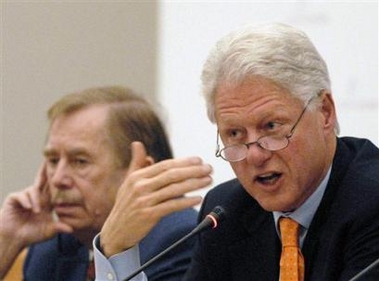|
Clinton calls impeachment egregious abuse
(AP)
Updated: 2005-11-12 09:56
Former US president Bill Clinton called Congress' impeachment of him an
"egregious" abuse of the Constitution and challenged those who say history will
judge him poorly because of his White House tryst with Monica Lewinsky.
Speaking at an academic conference examining his presidency in Hempstead,
New York, Thursday, Clinton challenged historian Douglas Brinkley's
comments in a newspaper interview that Clinton would be deemed a great president
were it not for his impeachment.
"I completely disagree with that," Clinton said in his speech at Hofstra
University. "You can agree with that statement, but only if you think
impeachment was justified. Otherwise, it was an egregious abuse of the
Constitution and law and history of our country."

Former U.S. President Bill Clinton, right,
makes his speech as former Czech President Vaclav Havel listens during the
evening plenary session of an annual conference of the Club of Madrid in
Prague, on Friday, Nov 11, 2005. [AP] | Clinton
was acquitted by the Senate of perjury and obstruction of justice at his 1999
impeachment trial, which he argued was not about what he called his
"misconduct."
"Now if you want to hold it against me that I did something wrong, that's a
fair deal," he said. "If you do that, then you have a whole lot of other
questions, which is how many other presidents do you have to downgrade and what
are you going to do with all those Republican congressmen, you know, that had
problems?"
Clinton touted what he called the achievements of his eight-year presidency,
from Middle East peace initiatives to turning around the U.S. economy.
His remarks were cheered loudly by the audience.
Clinton said his administration's failures included its slowness to act to
halt the genocide in Rwanda and the decision to allow federal agents to raid a
cult leader's compound in Waco, Texas. Nearly 80 cult followers died in a fire
during the 1993 confrontation.
"We should have waited them out," he said.
The presidential conference is the 11th to be held at Hofstra; the first in
1982 examined the presidency of Franklin Delano Roosevelt.
|